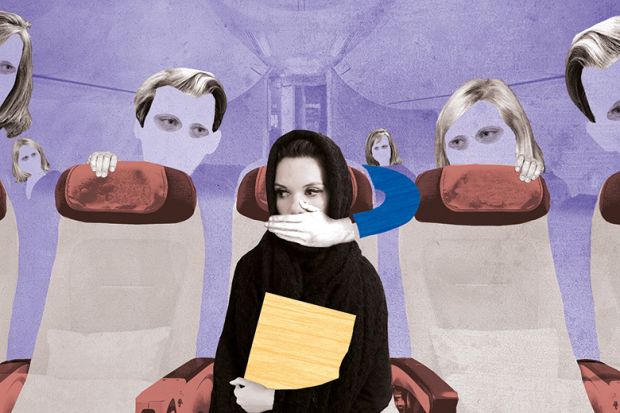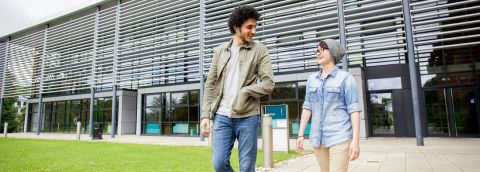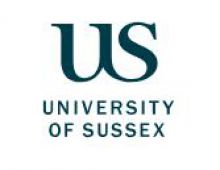The Twitter hashtag #TravellingWhileMuslim has been around since 2011. Clicking on it reveals stories regarding the everyday experiences of Muslim passengers and their attempts to navigate border control in airports across the world. There are tales of people being subjected to hostile questioning and racial abuse, as well as being ejected from flights for a variety of reasons, including texting in Arabic, speaking in Arabic or making people “uncomfortable” by their mere Muslim presence.
While there has been considerable media attention focused on these incidents, there has been surprisingly little acknowledgement by those in the academy of the additional barriers that such incidents erect to Muslim academics’ full participation in scholarly life. For my part, for instance, I have decided to withdraw from next month’s International Studies Association Annual Convention in Baltimore. This is an important date in the calendar of those who work in international relations. However, Donald Trump’s election victory, which followed a campaign during which he raised the prospect of Muslim registers and internment and which provoked a spike in hate crimes against minorities, has combined with my previous experience of being racially profiled by a US airline and airport staff while travelling to attend the ISA’s 2013 convention in San Francisco to convince me that the personal cost of attending this year’s event would be too high. I now feel – and I doubt that I am alone in this regard – that I would be genuinely and immediately unsafe in the US.
This perspective politicises the question of where academic conferences are held and how far organisers are cognisant of problems facing potential delegates. And what are the implications for the kind of debates that can be had if non-whites don’t feel able to attend?
The barriers faced by Muslim scholars do not relate only to travel. In the UK, recent legislation requiring academics to report any student who they deem to be at risk of radicalisation also has specific implications for Muslim academics. Teaching critical approaches to terrorism and counterterrorism entails challenging dominant political wisdom on everything from radicalisation to the very concept of terrorism itself. When I teach students that these concepts are inherently political, embedded within the neocolonial context of the War on Terror and productive of distinct racial and gendered hierarchies, I worry. I worry, as an academic with brown skin and a Muslim name, that my words may be misconstrued as apologies for indiscriminate violence. I worry that my enthusiasm for my research, my desire to politicise my students and my anger at contemporary political discourse is mistaken for a symptom of something darker. This leads me to go through teaching material with a fine-tooth comb and to measure my words very carefully.
All this imposes three demands on the academy. The first is to give greater space and voice to Muslim scholars in order that their problems be more widely recognised by managers and colleagues. The second is to lend a hand to those affected. This could involve anything from pastoral care to changing how and where academic debates are to be had.
The third, and most important, is to collectively resist the discrimination and racism that gives rise to this situation, on behalf not just of Muslim scholars but of society more broadly. The problem is that, as literary theorist Terry Eagleton has argued, “what we have witnessed in our own time is the death of universities as centres of critique”.
This trend is manifest in the co-option of universities and academics in contributing to the making of security policy on behalf of governments, for which there is ample funding. At a time when academics are beholden to metrics such as the research excellence framework and grant rounds are fiercely competitive, such funding has proved to be something of a boon. But the effect of the collapsing distance between the university and government has been insidious. The very categories that should be subject to sustained critical interrogation – terrorism, radicalisation and extremism – are taken as the starting point for creating secure borders and subjects. The Prevent duty is a clear example of racialised hierarchies in action, as can be attested to by those Muslim research students who have been investigated for their research on terrorism in recent years. To sit in a library and read an academic text on your subject has become problematic if you happen to be a young Muslim male.
Universities are not mere service providers and students are not mere consumers – or, worse, suspects to be surveilled. Higher education institutions must be places of critical practice, which bring to bear the weight of scholarship on the societies of which they are a part. Academics still have space and agency to practise such critique, through their teaching, research or even the module handbooks they design – that determine the narratives that are heard and those that aren’t.
It is imperative that we reach out and make coalitions across borders – national, disciplinary and institutional – in defence of our colleagues, our students and a more progressive politics.
Nadya Ali is a lecturer in international relations at the University of Sussex.
POSTSCRIPT:
Print headline: I regret I am unable to attend...the grounding of Muslim scholars
Register to continue
Why register?
- Registration is free and only takes a moment
- Once registered, you can read 3 articles a month
- Sign up for our newsletter
Subscribe
Or subscribe for unlimited access to:
- Unlimited access to news, views, insights & reviews
- Digital editions
- Digital access to THE’s university and college rankings analysis
Already registered or a current subscriber?






